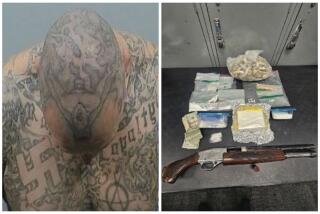Trial Begins for 2 in Alleged Race Plot
BOSTON — The trial of a couple described by prosecutors as white supremacists who planned to set off a “racial holy war” got underway here Monday with jury selection, in a case that the judge said has taken on new significance “in a post-9/11 setting.”
Along with hate crimes and domestic terrorism, Leo Felton and his girlfriend, Erica Chase, are charged with conspiracy, making counterfeit bills, obstruction of justice, and firearms and explosives violations.
The 31-year-old Felton could be sentenced to life in prison. Chase, 22, could get a maximum of 35 years behind bars.
Prosecutors allege that the pair intended to “blow up some structure, building, property or memorial associated with Jewish- and/or African Americans, thereby advancing the defendants’ anti-Semitic and white-supremacist goals and igniting ‘a racial holy war.’ ”
Felton, a 6-foot-7-inch ex-convict with the words “skin” and “head” tattooed in Gothic letters on his skull, has pleaded not guilty. Chase, who also entered a not guilty plea, told investigators the couple wanted to explode a homemade bomb on a beach “for entertainment.”
The alleged plot unfolded in April 2001, when Felton and Chase reportedly tried to use counterfeit $20 bills at a Dunkin’ Donuts. Police searching their apartment found brochures about building bombs and forging identities. They also discovered books on terrorism and a 50-pound bag of ammonium nitrate--the same type of fertilizer employed by Oklahoma City bomber Timothy J. McVeigh.
Authorities linked Felton to a supremacist organization called the White Order of Thule. Members of the group, which disbanded in the summer of 2000, advocated the superiority of the Aryan race as represented by Norse, Viking and other ancient Nordic cultures.
Authorities say newspaper clippings and other material found at the couple’s apartment led them to believe Felton and Chase may have planned to blow up Boston’s African-American Museum, the New England Holocaust Memorial or a new bridge named for the late Leonard P. Zakim, former head of the Anti-Defamation League here.
A bioterrorism guidebook that explains how to kill people with nerve gas also was found in Felton and Chase’s apartment in Boston’s North End.
Felton’s lawyer, Lenore Glaser, said in court papers that prosecutors have no evidence of an actual bomb. Glaser also contends that the government cannot prove Felton and Chase intended to bomb an ethnic target.
Chase insisted in court documents that “there were not any kind of terrorist plans at all.”
Felton is the son of a white mother and an African American father, both former civil rights activists. He was released from a New Jersey prison in January 2001 after serving 11 years for attempting to murder a black taxicab driver in New York with a crowbar. While imprisoned, authorities said, he tried to slit the throats of an African American and a Latino inmate.
Felton attempted suicide in jail following his indictment in June 2001 after news reports revealed his racial heritage.
Writing to a Boston newspaper while he was in jail, Felton attributed his problems to his parents and their interracial marriage. He blasted the mixing of black and white blood as “evil.”
Chase, a slight woman who wears her dark hair in long ringlets, began writing to Felton in prison two years ago through an outreach ministry run by the World Church of the Creator--a religion established for “the survival, expansion and advancement of [the] White Race exclusively.”
Because of “the inflammatory nature of the accusations,” U.S. District Judge Nancy Gertner said she expected jury selection to continue for at least a week.
Gertner said Monday that of 100 prospective jurors, 19 were excused.
Although she turned down a defense request to hold a bench trial--in which the jury is waived--Gertner conceded that some jurors could feel “nervous” about a trial involving explosives “in light of Sept. 11.”
Beyond the defendants’ guilt or innocence, the case, said Amy Yellin, spokeswoman for the New England office of the Anti-Defamation League, serves as “a reminder of the significant threat to our communities that is posed by modern-day extremists who have access to weapons that can cause significant harm.” The trial is scheduled to last five weeks.
More to Read
Sign up for Essential California
The most important California stories and recommendations in your inbox every morning.
You may occasionally receive promotional content from the Los Angeles Times.










